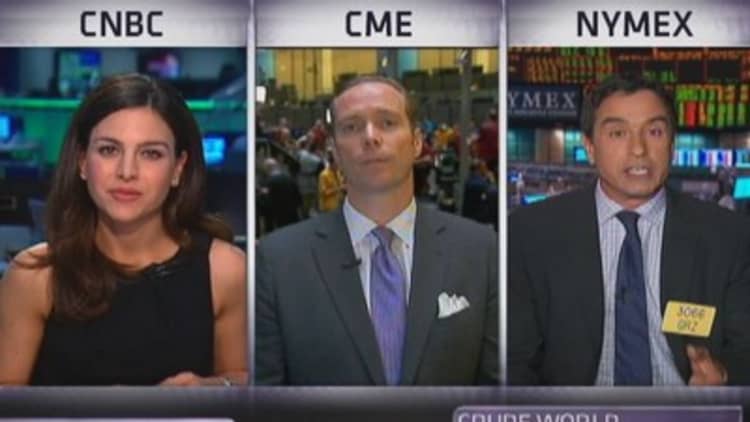Gasoline costs in the U.S. could fall as much as 30 cents a gallon if lawmakers would repeal a controversial shipping law, industry experts say.
The longstanding Jones Act—a section of The Merchant Marine Act of 1920—which requires any ship that carries goods or commodities in U.S. waters be American made, owned, operated and carry a U.S. flag, is being highlighted by one oil CEO as a reason behind the high price of gasoline in the U.S. and particularly in Florida.
"If foreign owned and flag ships were able to carry gasoline in US waters, the price of gasoline in the North East and in Florida could be 20 to 30 cents lower," Joe Petrowski, CEO of Gulf Oil, said.
(Read more: Watch out, US crude prices could correct 35%: Pro)
Petrowski added it also makes environmental sense.

"This goes beyond gasoline," he said. "Consumer products which are transported by trucks could also be shipped on U.S. waters, which would ease congestion on roads, reduce emissions and save money."
Vessels made in the United States are more than triple the price tag of their international competitors.
A mid-sized product tanker called an MR Tanker costs $130 million in the United States versus $34 million in Korea, and a 4800 TEU (20-foot equivalent unit) container ship would have a price tag of $200 million in the U.S. vs. $46 million in South Korea, according to Marine Money International.
Shipping insiders say the "American Made" mandate has had a negative impact on the U.S. transportation system.
(Read more: No glut here: Why Gulf refiners face a squeeze)
"The high cost of U.S. ship construction coupled to the Jones Act's absolute prohibition on the importation of foreign-built vessels has led to an inefficient major domestic transportation market sector saddled with an artificial shortage of ships, while the world is actually well supplied with modern and safe tonnage." said Michael Hansen, president of the Hawaii Shippers Council.
The council has its own reform proposal addressing the impact of the Jones Act on Alaska, Guam, Hawaii and Puerto Rico.
This is not the first time the price tag of the Jones Act has been talked about.
Ed Morse, chief commodity analyst at Citigroup, has said publicly the Jones Act adds between $6 and $8 a barrel to transport costs. Morse has said that based on his calculations, it's often cheaper for a Gulf Coast refiner to send gasoline to Brazil than to New York.
Per Heidenreich of private investment company Heidenreich Enterprise said that while he has no personal knowledge of how Petrowski came up with his calculations, he doesn't disagree and stressed the price of gasoline is also being jacked up in California.
(Read more: CFTC charges energy trading firm with 'spoofing')

"I will not doubt his calculations considering the domestic freight on tankers have increased on time charter basis to about $100,000 per day (compared to foreign-flag equivalent ships that earn about $12,000 per day)," Hedenreich said.
"There are also 17 or so Jones Act tankers that carry crude from Alaska to California that add to the cost of energy at the pump in California," he continued. "With Exxon's two new buildings under construction at Aker Philadelphia Shipyard at cost in excess of $200 million each, tankers that will replace old Jones Act tankers in the Alaskan/California trade this will sure increase the price at the pump in California."
Supporters of the Jones Act vehemently disagree with those who blame higher gasoline prices on the Jones Act.
Michael Roberts, senior vice president and general counsel of Crowley Maritime, noted that domestic shipping capacity is higher now than a year ago.
"This would tend to drive gasoline prices lower, not higher," Roberts said.
He also noted that marine transportation makes up a tiny fraction of the overall cost of gasoline.
The incremental cost of using American vessels and crews in U.S. domestic trade is also very small, "more like a tenth of a penny per gallon at the pump. I just don't see any truth in those numbers."
The price of fuel expands beyond the pump.
The airline industry, whose largest expense is fuel, is also behind the structural change in the legislation that would allow foreign-made vessels to transport on U.S. waters.
"Marine transportation is the only mode of transportation that has a restriction on where the vehicle used to provide the transportation is built. And in this case it's the restricting the vessels used on U.S. waters to be built in the United States." said John Heimlich, chief economist for Airlines for America.
"We don't need to change the entire piece of legislation but we need legislation that can benefit and reflect today's economy. Any commodity that moves by vessel is effected here," he said.
Heimlich said that between the Boston, Miami Dade and Fort Lauderdale airports, the Jones Act premium on jet fuel combined annual of $80-100 million dollars.
"What this means for customers is either a downward pressure on the amount of service we can offer or an upward pressure on price," he said.
Airports that are reliant on the transport of jet fuel also include, Fort Lauderdale, San Juan, Alaska, San Francisco, Los Angeles and Honolulu.
"Bottom line we will pay several cents more a gallon to fuel up at Boston's Logan or Miami than at D.C., Atlanta or Chicago, in terms of transportation costs." Heimlich said.
With consumers feeling the crunch at the pump with the U.S. national average around $3.66 a gallon and other industries such as the airlines getting hit as well, the time could be now for Washington to revisit the Jones Act.
(Read more: Gas prices jump, and are going higher, says AAA)
But energy analyst Kevin Book, managing director of research at Clearview Energy Partners, is not hopeful,
"The Jones Act has been around for 100 years and it hasn't been repealed yet," he said. "The argument that opening tanker markets to foreign flagged vessels would lower gasoline prices in the Northeast may be intellectually correct, but it also is politically tone deaf."
"Arguably, de-bottlenecking the mid-continent could make this argument stronger even with rails contributing to east coast supply," Book added. "As crude pools in the Gulf of Mexico, the price might make the trip by ship more accommodating."
Petrowski added that not only would repealing the law be more accommodating, but it would also incentivize refiners to invest capital in their refineries to increase capacity.
That would not only help drive down the price of gasoline—because there would be more supply—but it also would create jobs.
(Read more: Apache sells some Gulf holdings for $3.75 billion)
Repealing discussions are not new on Capitol Hill.
On June 25, 2010, Sen. John McCain introduced a bill called, "Open America's Water Act," which would fully repeal the Jones Act on anti-competitiveness grounds. But the move failed.
The GAO recently released a report on the impact the Jones Act has on the shipping market between the U.S. and Puerto Rico, and if modifying the Act would make sense. The results were inconclusive.
Shipping experts say they are frustrated with the lack of initiative from Congress to have a comprehensive plan on how to bring the law into the 21st century.
"We have gained no traction with this mission, which we call 'short sea shipping,' with any of our politicians." said Bob Curt retired vice president of ExxonMobil's worldwide Marine Transportation Division,
"No one seems to care about I-95 traffic, safety (the bus accidents), pollution and trucks tearing up our roads," he added. "Ships would not do this. Our mission is not to attack the Jones Act oil tanker business, but to get trucks with dry cargo and containers off the highways between Virginia and Boston and reduce transportation cost, improve road travel, reduce pollution, especially in the Northeast."
John Hill, marine consultant says the time is now for the Jones Act to be revised.
"In today's maritime world, the Jones Act has morphed from a strong positive to the biggest single reason for the demise of the US Merchant Marine," he said.
_By CNBC's Lori Ann LaRocco. Follow her on Twitter @loriannlarocco.






